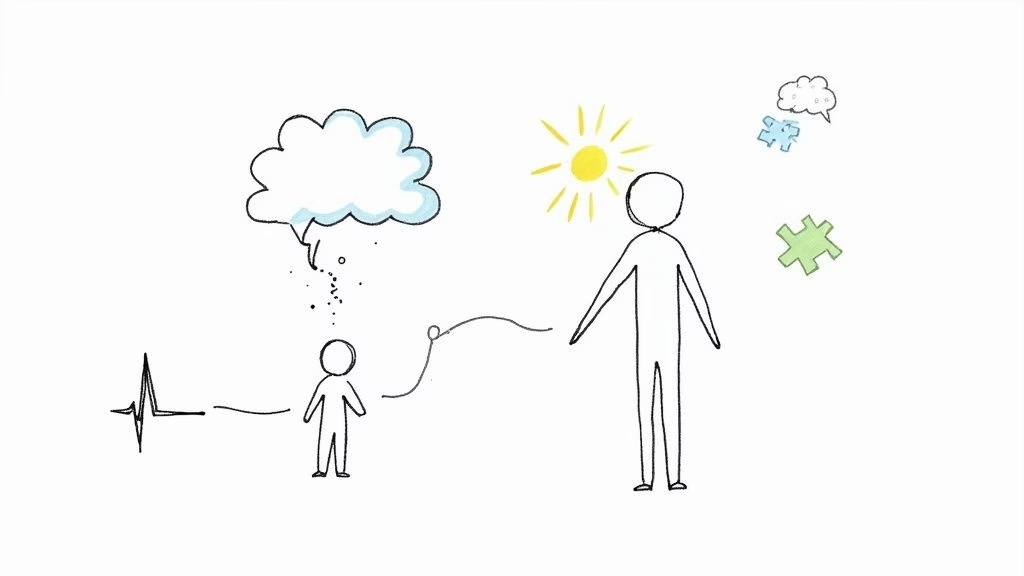Being a teenager is tough. Being the parent of a teenager can be even tougher. Trying to get them to talk about anything meaningful can feel like pulling teeth, especially when their face is buried in a screen.
But here’s the thing: those communication skills are more critical now than ever. It's not just about making small talk. It’s about learning to navigate the messy, complicated world of high school, friendships, and eventually, a career.
Why Communication Is a Superpower for Teens
Let's face it, with so much of life happening through screens, teens are getting less practice with real, face-to-face conversations. They're missing out on the small, everyday moments where you learn to read a room, understand body language, or work through a disagreement without a keyboard.
When those skills are weak, it shows up in other areas:
- At School: Ever wonder why your teen procrastinates? Sometimes, it's not laziness. It’s because they don’t know how to ask a teacher for help or feel too anxious to speak up in a group project. The ability to articulate what they don't understand is a game-changer for their academic confidence.
- With Their Mental Health: The American Psychological Association has pointed out that teens today report stress levels even higher than adults. That's a heavy burden to carry. Being able to talk about what they're feeling—to name the anxiety, the pressure, the overwhelm—is one of the most powerful tools they have for managing it.
- Building Real Confidence: There's a huge confidence boost that comes from feeling seen and heard. When a teen can express their thoughts and feelings clearly, it validates their experience. This is especially true for teen boys, who often get the message that they should bottle everything up.
It’s a Skill, Not a Personality Trait
The good news? Communication isn't something you're just born with. It's a skill, and like any skill, it can be learned, practiced, and strengthened.
As a parent, you can start by modeling it. Create a home where it’s safe to have hard conversations. For teens themselves, there are incredible resources out there, like men's groups or specialized programs that create a supportive space for teen boys who find it hard to connect. You can find more practical parenting tips and resources in our complete guide to communication skills for teens.
A key part of developing these skills is self-awareness. Simple practices like a guided meditation can help teens manage stress, improve focus, and better understand their own emotional responses, which is the bedrock of healthy communication.
This article is designed to be a practical roadmap. We’ll get into the specifics of verbal, nonverbal, and even digital communication, with real strategies that actually work. The goal isn't just to get them talking—it's to empower them for whatever comes next.
Navigating the New Rules of Digital Communication
Let’s be real: DMs, snaps, and group chats have pretty much replaced face-to-face hangouts for a lot of teens. While social media can be an awesome way to connect and find your people, it brings a whole new set of challenges that previous generations never had to think about—like figuring out someone's tone without seeing their face or dealing with the pressure of a perfectly curated online life.
This shift away from in-person time is huge. Between 2003 and 2022, face-to-face social time for teens dropped by over 45%. That's a massive change, and it's directly linked to more screen time, which has completely rewired how teens build and maintain friendships. You can learn more about how social skills have evolved from these findings.
From Emojis to Empathy
One of the trickiest parts of digital communication is reading the tone. A simple "k" can feel like a slap in the face, and a text without emojis might come across as angry. This is where a new kind of emotional intelligence comes into play.
Learning to pause before reacting is a superpower. Instead of assuming the worst from a vague text, encourage your teen to consider other possibilities or, even better, to just ask, "Hey, just wanted to check how you meant that?"
This one small habit can head off so many misunderstandings and pointless arguments. It’s all about teaching them to seek clarity instead of jumping to conclusions—a core skill that works just as well offline as it does online.
This really drives home the point that real communication, whether you're reading a text or listening to a friend, requires your full attention.
Navigating the nuances of digital versus in-person interaction can be tricky. Each has its own set of rules, benefits, and drawbacks that teens are learning to manage.
Digital vs Face-to-Face Communication
| Aspect | Digital Communication (Text, Social Media) | Face-to-Face Communication |
|---|---|---|
| Tone & Nuance | Easily misinterpreted. Heavy reliance on emojis, punctuation, and shared context to convey feeling. | Rich with nonverbal cues (body language, tone of voice, eye contact) that provide immediate context. |
| Pacing | Asynchronous. Allows time to think and craft a response, which can reduce pressure but also create anxiety. | Spontaneous and immediate. Requires quick thinking and active listening, building conversational reflexes. |
| Social Pressure | Pressure to present a curated, "perfect" version of oneself. Risk of social comparison and FOMO. | More authentic and unfiltered. Allows for vulnerability and genuine connection without a digital filter. |
| Conflict Resolution | Difficult. Misunderstandings can escalate quickly. Avoidance is easy, making true resolution harder. | Direct and often more effective. Forces individuals to address issues head-on and practice empathy. |
| Skill Development | Builds skills in written expression and understanding digital etiquette. | Develops crucial interpersonal skills: active listening, empathy, reading social cues, and public speaking. |
While digital tools offer convenience, they can't replace the depth and skill-building that comes from real, in-person conversations. The key is helping teens find a healthy balance between both worlds.
Mental Health and Setting Boundaries
The digital world isn't just a place to talk; it's deeply connected to mental health, motivation, and even procrastination. The endless scroll can trigger social comparison, anxiety, and a feeling of being left out, which can kill a teen's drive for schoolwork or other goals.
Here are a few practical tips for parents to help foster a healthier relationship with technology:
- Model What You Preach: Put your own phone away at the dinner table. If you're checking notifications, they will too. Your actions are far more powerful than your words.
- Create "No-Tech" Zones: Make bedrooms or the hour before bed screen-free. This helps the brain wind down and protects sleep.
- Talk About Digital Etiquette: Have open conversations about what's okay to share online, how to disagree with someone respectfully, and the fact that their digital footprint is permanent.
For teen boys, who often face unique pressures, online spaces can sometimes feel more isolating than connecting. It's important to point them toward supportive resources. There are men's groups and online communities designed for young men that offer a safe space to talk about what they're going through without fear of judgment. Even a simple practice like a guided meditation can be a game-changer for managing the stress of being constantly plugged in.
Mastering Real-World Conversations

Moving a conversation from behind a screen into the real world uses a totally different set of muscles. Face-to-face conversations can feel messy and spontaneous, but they’re also incredibly powerful. The good news is, anyone can build confidence here.
It all starts with a simple shift in focus: stop worrying about what you’re going to say next and start paying attention to what the other person is actually saying.
This is the core of active listening. It’s not just waiting for your turn to talk; it's about showing someone you're genuinely hearing them, both with your words and your body language.
The Power of Nonverbal Communication
So much of what we communicate has nothing to do with what we say. Your body language can either pull someone in or push them away, and a few small adjustments can make all the difference in how your message lands.
-
Posture and Presence: It sounds simple, but just sitting up straight and uncrossing your arms makes you seem way more open and approachable. It's a nonverbal cue that you're present and interested.
-
Eye Contact: This one's a big deal. You don’t need an awkward staring contest, but making consistent eye contact shows you’re paying attention. Try holding it for a few seconds at a time, especially when they're talking.
-
Facial Expressions: A quick nod or a genuine smile is a powerful tool. It silently tells the other person, "I hear you, and I get it."
And this isn't just fluffy advice. A 2023 study on communication training found that teens who intentionally worked on things like eye contact and speaking clearly saw real, measurable improvements in their conversational skills.
Keeping the Conversation Flowing
Ever been in one of those conversations that just… dies? It’s awkward for everyone. Usually, it’s because the questions dried up. The engine that keeps a good dialogue moving is asking thoughtful, open-ended questions.
Instead of asking things that get a simple "yes" or "no," try asking questions that invite a story or an opinion.
Think about the difference here:
-
Instead of: "Did you have a good weekend?"
-
Ask: "What was the best part of your weekend?"
-
Instead of: "Do you like that class?"
-
Ask: "What’s the most interesting thing you've learned in that class so far?"
These small tweaks can turn a boring exchange into a real opportunity to connect. For more strategies like this, check out our guide on teen communication skills.
The goal isn't to perform perfectly in every conversation. It's about being curious and genuinely interested in the person you're talking to. When you focus on understanding them, the pressure to say the "right thing" fades away.
Getting a handle on interpersonal dynamics is key, and sometimes the best insights come from unexpected places. Diving into books about love and relationships can teach you a ton about empathy, different perspectives, and emotional intelligence. Building that foundation makes every conversation—from casual chats to serious talks—feel a lot more natural and way less intimidating.
Connecting Communication to School and Motivation
Effective communication isn't just a "nice-to-have" social skill—it's a game-changer for a teen's academic success and their drive to succeed. I see it all the time: a teen isn't procrastinating because they're lazy. They're stuck because they don't know how to ask for help, get clarity on an assignment, or just speak up for what they need in a packed classroom.
When a teenager feels like they aren't being heard or are misunderstood at school, their motivation can completely flatline. But when they learn how to articulate their thoughts clearly, it can break that cycle. Confusion turns into confidence, and that feeling of being stuck transforms into real progress.
Turning Procrastination into Participation
The link between how a teen communicates and how they perform in school is direct and powerful. A teen who can walk up to a teacher after class and ask a clarifying question is way less likely to get bogged down and give up on homework that night. In the same way, one who can actually collaborate with their peers will find group projects less of a nightmare and more of a genuine learning experience.
This kind of proactive communication gives them a sense of ownership over their education. It's a huge mindset shift, moving them from just passively taking in information to actively engaging with it.
Strong communication skills help teens advocate for themselves. Instead of avoiding a tough subject, they learn to say, "I'm struggling with this concept, can you explain it differently?" That one sentence is a massive step in knocking down academic hurdles and building resilience.
When we help them build these skills, we're showing them that their voice actually matters in their own education. That feeling of empowerment is a core ingredient for keeping motivation alive.
Practical Communication Strategies for the Classroom
So how do we boost a teen's ability to communicate at school? It’s all about small, practical steps. Things like speaking up in class discussions or giving presentations are huge sources of anxiety for most teens, but they're also the perfect training ground for growth.
Here are a few actionable tips I give the teens I work with:
- Prep a Few Talking Points: Before a class discussion, just jot down one or two ideas or questions you have about the topic. Having something in your back pocket takes all the pressure off having to think of something brilliant on the spot.
- Use "I" Statements with Teachers: When you need to talk about a grade or an assignment, framing it with "I feel confused about…" or "I was hoping to understand…" opens the door for a real conversation, not a confrontation.
- Practice in a Low-Stakes Way: Rehearse that presentation in front of a mirror, your dog, or a family member. The whole point is just to get comfortable with the words coming out of your mouth.
For parents, figuring out how to motivate teenagers often comes down to creating a safe space where they can practice these skills without the fear of messing up. With today's mix of in-person and online learning, knowing how to communicate effectively on a screen is just as important. For ideas on creating engaging online learning environments, check out these tips for effective video conferencing in education. Building these foundational skills directly translates into better school performance and a much more positive outlook on their whole academic journey.
How Parents Can Support Their Teen

As a parent, you play a huge part in helping your teen find their voice. It’s not about giving lectures. It’s about creating a space at home where they feel safe enough to open up—especially when they're wrestling with a lack of motivation or the stress that comes with school.
Think of your home as a practice ground, a place where they can learn to handle tough conversations. The real shift happens when you move from trying to "fix" their problems to just listening to understand. When a teen feels truly heard, without judgment, they’re so much more likely to share what’s really going on. That could be anything from procrastinating on a huge project to dealing with social anxiety.
Fostering Open and Honest Dialogue
Trust starts when you model the behavior you want to see. When you talk about your day, don't just share the wins. Talk about the moments of frustration or when you felt unsure. This shows them that being vulnerable is okay and that challenges are just a normal part of life.
Here are a few practical parenting tips to improve communication skills for teens:
- Ask Open-Ended Questions: Instead of, "Did you have a good day?" which usually gets a one-word answer, try something like, "What was the most interesting part of your day?" This invites a story.
- Validate Their Feelings: Use phrases that show you're listening. "That sounds really frustrating," or "I can totally see why you'd be upset about that." You don't have to agree with them to acknowledge their emotions.
- Schedule Unplugged Time: Make time where everyone puts their phones away. Dinner is a classic for a reason, but a walk or even just a drive can work wonders. It creates a natural space for real face-to-face connection.
- Be a Student of Your Teen: Pay attention to what sparks their interest, even if it seems trivial to you. Asking genuine questions about their favorite video game or artist shows you care about their world, which builds a bridge for bigger conversations later.
Remember, the goal isn't to force them to talk on your schedule. It's about being consistently available and approachable. That way, they'll come to you when they're ready. Patience is everything.
Resources for Deeper Support
Sometimes, conversations about mental health need more than just a listening ear. Research shows that teens report feeling even higher levels of stress than adults, so having resources ready is key. This is especially true for young men and teen boys, who often feel an intense pressure to bottle up their emotions.
Finding the right kind of support for them is vital. Look into men's groups or communities created specifically for teen boys who are struggling. These spaces can provide a safe outlet for them to express themselves and connect with others who get it.
Another powerful tool is a simple guided meditation. It can help with managing stress and improving focus—both of which are foundational for healthy communication. You can find tons of free meditation guides for teens online that they can try right from home, helping them build self-awareness and learn to regulate their emotions.
Mental Health Resources for Young Men
Let's be real: society sends young men and teen boys a pretty clear, if unspoken, message—don't be vulnerable. Don't ask for help. Asking for help is often framed as a sign of weakness, which can make it incredibly difficult to talk about emotions, leading to isolation and mounting stress.
Improving communication skills for teens, especially for young men, has to start with creating a safe space to be heard. When a teen boy feels like he can actually express himself without being judged, it does wonders for his mental health, builds resilience, and dramatically improves his relationships with family and friends.
Finding Supportive Communities
The good news is there are some incredible resources out there specifically designed to support young men who are struggling. These groups offer a judgment-free zone where they can connect with others who actually get what they're going through.
Here are a few places to start looking:
- Men's Groups: Organizations like The ManKind Project create structured communities where men of all ages can explore emotional expression and personal growth. These groups actively challenge those outdated ideas of masculinity.
- Online Communities: There are a ton of online forums and platforms that offer anonymous, supportive spaces for teen boys to talk about mental health, the stress of school, and relationship issues.
- Mental Health Hotlines: Confidential hotlines are always available. They provide immediate support from trained professionals when a teen just needs to talk to someone right away.
For teens who need direct help or guidance, exploring Buddypro support services can provide some really valuable resources for mental well-being. The whole point is to find a place where a young man feels like he can finally let his guard down and speak honestly.
A Simple Meditation for Stress and Focus
Self-awareness is the bedrock of healthy communication. When a teen understands his own emotional triggers, it becomes way easier to manage stress, sidestep procrastination, and communicate clearly. Meditation is a powerful, no-nonsense tool for building this exact skill.
The goal of meditation isn’t to silence your thoughts—it’s to notice them without getting carried away. This practice of observation builds focus and emotional regulation, two skills that are essential for navigating difficult conversations.
Here's a simple, guided meditation script any teen can follow. No experience needed.
- Find a comfortable spot. Sit upright in a chair but stay relaxed. Feet flat on the floor, hands resting in your lap.
- Close your eyes gently. Take a slow, deep breath in through your nose, feeling your belly expand. Then, breathe out slowly through your mouth. Do this three times.
- Bring your focus to your breath. Don't try to change it. Just notice the sensation of the air moving in and out of your body.
- Notice your thoughts. Your mind is going to wander. That's totally normal. When you notice a thought, just acknowledge it without judgment and gently guide your attention back to your breath.
- Continue for 3-5 minutes. When you're ready, slowly bring your awareness back to the room and open your eyes.
Doing this simple exercise daily can make a massive difference in managing school-related anxiety and improving overall focus. It's a quiet but powerful step toward building the inner strength needed for great communication.
At Andrew Petrillo Life Coaching, we provide teens with practical strategies to build confidence, manage stress, and develop the communication skills they need to succeed. If your teen is struggling with motivation or needs guidance to navigate their academic and personal goals, learn how our personalized coaching can help at https://andrewpetrillolifecoaching.com.



















